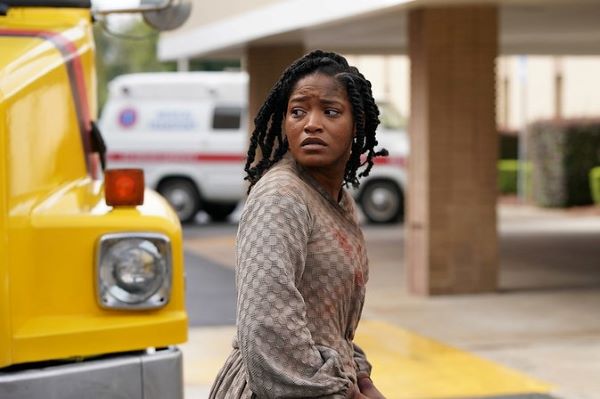This confused debut from writer/director Krystin Ver Linden (apparently based on true cases) is part harrowing slave drama and part modern blaxploitation wish fulfilment genre flick. Alice is clearly intended as a contemporary fable for all those who suffered and died under a monstrous system and were never afforded personal retribution. But what could have worked as a dark and edgy revenge thriller – and a fierce performance from Keke Palmer in the titular role certainly impresses – it gets stuck between two modes of storytelling and does justice to neither.
Surprisingly, the central reveal of Alice’s predicament is a big part of its promotion. Having lived a miserable life of brutality; physical, mental, and sexual, at the hands of plantation owner Paul Bennett (Jonny Lee Miller, resembling a long-lost Carradine brother), the apparent murder of her new husband Joseph (Gaius Charles) is the final straw. She attacks Bennett, escapes through the woods, and is almost flattened by a truck driven by disillusioned civil rights activist Frank (Common). For the year is 1973, and Bennett’s plantation has somehow operated for over 100 years after the Emancipation Proclamation.
It’s an interesting premise, if hugely similar to last years similarly messy Antebellum. And like that film it gets torn in half between respect for history and the clear aim, which is to make a rousing genre film. Ver Linden takes too long establishing the world of the plantation as taking place in the antebellum when the fact it isn’t is not intended as a grand reveal. There simply isn’t enough time left to fully settle into the fiery mood of righteous emancipation it wants to take. It’s as if the plight of Alice, Joseph, and their fellow victims would be somehow lessened without being fully realised. That’s certainly an understandable impulse, Ver Linden wants to build as much empathy for her characters as possible. But if she assumes the audience’s contextual knowledge of 1970s black genre film as a given, she can surely assume the same with depictions of slavery on screen, from Roots through to The Underground Railroad.
Apart from the lopsided pacing, the silliest part is that Alice’s full transformation from brutalised slave to avenging angel takes place over the course of a day. That’s not to say the montage of her boning up on 20th century black history isn’t entertaining as she barrels through a whistle-stop tour of Malcolm X, Fred Hampton, Angela Davis, and others (and, wow! Books! Remember them?). But there’s no time to reckon with her trauma, let alone the overwhelming new world in which she’s found herself. Nevertheless, it’s less than 24 before she’s discovered Pam Grier, dosed herself with Coffy at the cinema and given herself a full makeover in the mould of her new heroine. You can also ask yourself why a plantation set in the 1970s has never modernised in any way, shape or form, either to tease a big twist reveal a la The Village, that the film never even promises.
It’s a shame that Ver Linden’s script never manages to reconcile the twin impulses of respect and irreverence that ultimately tear Alice in half. For it to succeed as the exhilarating thriller it wants to be, in needed to lean far harder into the latter aspect. As such, it manages to adopt the look of classic blaxploitation – it’s undoubtedly a handsome picture, and Palmer’s formidable talent keeps it eminently watchable – but not its tempestuous lack of restraint. Alice’s catharsis is simply too rushed to have the intended impact.
Screening as part of Sundance Film Festival 2022
